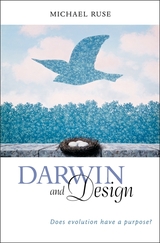
The intricate forms of living things bespeak design, and thus a creator: nearly 150 years after Darwin's theory of natural selection called this argument into question, we still speak of life in terms of design--the function of the eye, the purpose of the webbed foot, the design of the fins. Why is the "argument from design" so tenacious, and does Darwinism--itself still evolving after all these years--necessarily undo it?
The definitive work on these contentious questions, Darwin and Design surveys the argument from design from its introduction by the Greeks, through the coming of Darwinism, down to the present day. In clear, non-technical language Michael Ruse, a well-known authority on the history and philosophy of Darwinism, offers a full and fair assessment of the status of the argument from design in light of both the advances of modern evolutionary biology and the thinking of today's philosophers--with special attention given to the supporters and critics of "intelligent design."
The first comprehensive history and exposition of Western thought about design in the natural world, this important work suggests directions for our thinking as we move into the twenty-first century. A thoroughgoing guide to a perennially controversial issue, the book makes its own substantial contribution to the ongoing debate about the relationship between science and religion, and between evolution and its religious critics.
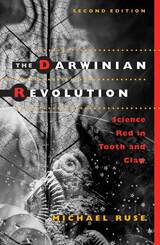
For this edition Michael Ruse has written a new afterword that takes into account the research published since his book's first appearance.
"It is difficult to believe that yet another book on Darwin and the Darwinian Revolution could add anything new or contain any surprises. Ruse's book is an exception on all counts. Darwin scholars and the general reader alike can learn from it."—David L. Hull, Nature
"No other account of the Darwinian Revolution provides so detailed and sympathetic an account of the framework within which the scientific debates took place."—Peter J. Bowler, Canadian Journal of History
"A useful and highly readable synthesis. . .skillfully organized and written with verve, imagination, and welcome touches of humor."—John C. Greene, Science
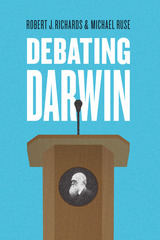
Examining key disagreements about Darwin that continue to confound even committed Darwinists, Richards and Ruse offer divergent views on the origins and nature of Darwin and his ideas. Ruse argues that Darwin was quintessentially British and that the roots of his thought can be traced back to the eighteenth century, particularly to the Industrial Revolution and thinkers such as Adam Smith and Thomas Robert Malthus. Ruse argues that when these influences are appreciated, we can see how Darwin’s work in biology is an extension of their theories. In contrast, Richards presents Darwin as a more cosmopolitan, self-educated man, influenced as much by French and particularly German thinkers. Above all, argues Richards, it was Alexander von Humboldt who both inspired Darwin and gave him the conceptual tools that he needed to find and formulate his evolutionary hypotheses. Together, the authors show how the reverberations of the contrasting views on Darwin’s influences can be felt in theories about the nature of natural selection, the role of metaphor in science, and the place of God in Darwin’s thought.
Revealing how much there still is to investigate and interrogate about Darwin’s ideas, Debating Darwin contributes to our understanding of evolution itself. The book concludes with a jointly authored chapter that brings this debate into the present, focusing on human evolution, consciousness, religion, and morality. This will be powerful, essential reading for anyone seeking a comprehensive understanding of modern-day evolutionary science and philosophy.
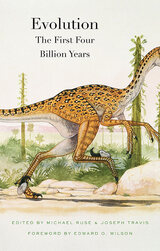
Spanning evolutionary science from its inception to its latest findings, from discoveries and data to philosophy and history, this book is the most complete, authoritative, and inviting one-volume introduction to evolutionary biology available. Clear, informative, and comprehensive in scope, Evolution opens with a series of major essays dealing with the history and philosophy of evolutionary biology, with major empirical and theoretical questions in the science, from speciation to adaptation, from paleontology to evolutionary development (evo devo), and concluding with essays on the social and political significance of evolutionary biology today.
A second encyclopedic section travels the spectrum of topics in evolution with concise, informative, and accessible entries on individuals from Aristotle and Linneaus to Louis Leakey and Jean Lamarck; from T. H. Huxley and E. O. Wilson to Joseph Felsenstein and Motoo Kimura; and on subjects from altruism and amphibians to evolutionary psychology and Piltdown Man to the Scopes trial and social Darwinism. Readers will find the latest word on the history and philosophy of evolution, the nuances of the science itself, and the intricate interplay among evolutionary study, religion, philosophy, and society.
Appearing at the beginning of the Darwin Year of 2009—the 200th anniversary of the birth of Charles Darwin and the 150th anniversary of the publication of the Origin of Species—this volume is a fitting tribute to the science Darwin set in motion.
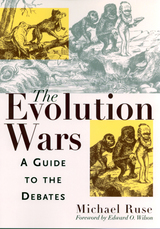
The Evolution Wars draws on history, science, and philosophy to examine the development of evolutionary thought through the past two and a half centuries. It focuses on the debates that have engaged, divided, and ultimately provoked scientists to ponder the origins of organisms—including humankind—paying regard to the nineteenth-century clash over the nature of classification and debates about the fossil record, genetics, and human nature. Much attention is paid to external factors and the underlying motives of scientists.
In these pages you will meet Charles Darwin’s ebullient grandfather Erasmus, the contentious Frenchmen Georges Cuvier and Etienne Geoffroy Stain-Hillaire, new creationist Phillip Johnson, the brilliant J. B. S. Haldane, outspoken Richard Dawkins, and many other stars of the debates.
The Evolution Wars explores the ten greatest controversies surrounding evolution in world history, with emphasis on recent times, including the infamous Scopes trial of the 1920s: the search for human origins and speculation about the “missing link,” spurred by the discovery of “Lucy;” the debate surrounding the new theory of paleontology proposed by Stephen Jay Gould; and the rise of teaching “creation science” in public school as a subject on par with evolution.
Although the author takes a strong stand on the side of evolution, he also shows respect for dissenting viewpoints. Thus, the book is intellectually rewarding not only for evolutionists but also for opponents of evolution theory, especially those who want to see how one of the great ideas of Western civilization resonates through time, both within and beyond the scientific community.
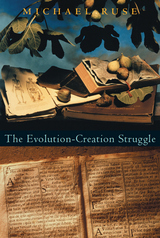
Creation versus evolution: What seems like a cultural crisis of our day, played out in courtrooms and classrooms across the county, is in fact part of a larger story reaching back through the centuries. The views of both evolutionists and creationists originated as inventions of the Enlightenment--two opposed but closely related responses to a loss of religious faith in the Western world.
In his latest book, Michael Ruse, a preeminent authority on Darwinian evolutionary thought and a leading participant in the ongoing debate, uncovers surprising similarities between evolutionist and creationist thinking. Exploring the underlying philosophical commitments of evolutionists, he reveals that those most hostile to religion are just as evangelical as their fundamentalist opponents. But more crucially, and reaching beyond the biblical issues at stake, he demonstrates that these two diametrically opposed ideologies have, since the Enlightenment, engaged in a struggle for the privilege of defining human origins, moral values, and the nature of reality.
Highlighting modern-day partisans as divergent as Richard Dawkins and Left Behind authors Tim LaHaye and Jerry B. Jenkins, Ruse's bracing book takes on the assumptions of controversialists of every stripe and belief and offers to all a new and productive way of understanding this unifying, if often bitter, quest.
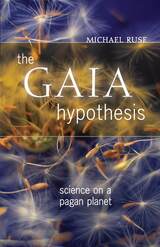
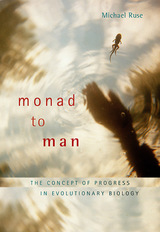
The idea of evolution: it fascinates some of us, disturbs others, and leaves only a very few people indifferent. In a major new interpretation of evolutionary theory, Michael Ruse pinpoints the common source of this attraction and discomfort. A renowned writer on evolutionary theory and its history, Ruse has long been sensitive to the fact that many people--and not simply religious enthusiasts--find something deeply troubling about much of what passes for science in evolutionary circles. What causes this tension, he finds in his search of evolutionism's 250-year history, is the intimate relationship between evolution and the secular ideology of progress.
Ubiquitous in Darwin's time, the idea of an unceasing improvement in life insinuated its way into evolutionary theory from the first. In interviews with today's major figures in evolutionary biology--including Stephen Jay Gould, Edward O. Wilson, Ernst Mayr, and John Maynard Smith--and in an intimate look at the discoveries and advances in the history and philosophy of science, Ruse finds this belief just as prevalent today--however it might be denied or obscured. His book traces the delicate line between those who argue that science is and must be objective and those who deem science a "social construction" in the fashion of religion or the rest of culture. It offers an unparalleled account of evolutionary theory, from popular books to museums to the most complex theorizing, at a time when its status as science is under greater scrutiny than ever before.
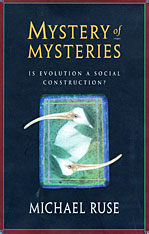
With the recent Sokal hoax--the publication of a prominent physicist's pseudo-article in a leading journal of cultural studies--the status of science moved sharply from debate to dispute. Is science objective, a disinterested reflection of reality, as Karl Popper and his followers believed? Or is it subjective, a social construction, as Thomas Kuhn and his students maintained? Into the fray comes Mystery of Mysteries, an enlightening inquiry into the nature of science, using evolutionary theory as a case study.
Michael Ruse begins with such colorful luminaries as Erasmus Darwin (grandfather of Charles) and Julian Huxley (brother of novelist Aldous and grandson of T. H. Huxley, "Darwin's bulldog" ) and ends with the work of the English game theorist Geoffrey Parker--a microevolutionist who made his mark studying the mating strategies of dung flies--and the American paleontologist Jack Sepkoski, whose computer-generated models reconstruct mass extinctions and other macro events in life's history. Along the way Ruse considers two great popularizers of evolution, Richard Dawkins and Stephen Jay Gould, as well as two leaders in the field of evolutionary studies, Richard Lewontin and Edward O. Wilson, paying close attention to these figures' cultural commitments: Gould's transplanted Germanic idealism, Dawkins's male-dominated Oxbridge circle, Lewontin's Jewish background, and Wilson's southern childhood. Ruse explicates the role of metaphor and metavalues in evolutionary thought and draws significant conclusions about the cultural impregnation of science. Identifying strengths and weaknesses on both sides of the "science wars," he demonstrates that a resolution of the objective and subjective debate is nonetheless possible.
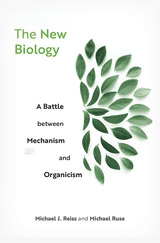
In this accessible analysis, a philosopher and a science educator look at biological theory and society through a synthesis of mechanistic and organicist points of view to best understand the complexity of life and biological systems.
The search for a unified framework for biology is as old as Plato’s musings on natural order, which suggested that the universe itself is alive. But in the twentieth century, under the influence of genetics and microbiology, such organicist positions were largely set aside in favor of mechanical reductionism, by which life is explained by the movement of its parts. But can organisms truly be understood in mechanical terms, or do we need to view life from the perspective of whole organisms to make sense of biological complexity?
The New Biology argues for the validity of holistic treatments from the perspectives of philosophy, history, and biology and outlines the largely unrecognized undercurrent of organicism that has persisted. Mechanistic biology has been invaluable in understanding a range of biological issues, but Michael Reiss and Michael Ruse contend that reductionism alone cannot answer all our questions about life. Whether we are considering human health, ecology, or the relationship between sex and gender, we need to draw from both organicist and mechanistic frameworks.
It’s not always a matter of combining organicist and mechanistic perspectives, Reiss and Ruse argue. There is scope for a range of ways of understanding the complexity of life and biological systems. Organicist and mechanistic approaches are not simply hypotheses to be confirmed or refuted, but rather operate as metaphors for describing a universe of sublime intricacy.
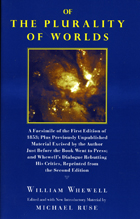
The publication of Plurality in 1853 ignited a bitter Victorian debate on science and religion. This book reprints the first edition in facsimile, together with a vigorous response to his critics that Whewell added later and new introductory and bibliographic material by noted Darwin scholar Michael Ruse. This edition also includes 84 typeset pages—never before published—that Whewell cut from the original book at the last moment. Showing clearly the theological underpinnings of Whewell's thinking, these chapters also reveal the difficulties facing any Victorian who tried to reconcile traditional Christian thought with the findings of modern science.
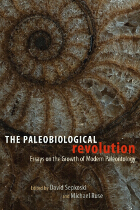
READERS
Browse our collection.
PUBLISHERS
See BiblioVault's publisher services.
STUDENT SERVICES
Files for college accessibility offices.
UChicago Accessibility Resources
home | accessibility | search | about | contact us
BiblioVault ® 2001 - 2024
The University of Chicago Press









